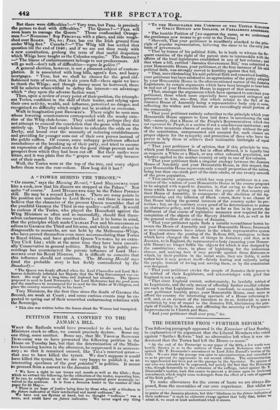" To THE HONOURABLE THE COMMONS OF THE UNITED KINGDOM
OF GREAT BRITAIN AND IRELAND, IN PARLIAMENT ASSEMBLED, " The humble Petition of [we suppress the name, as we understand the gentleman now means to go over to the Tories.] " Showeth, That your petitioner is steadfastly attached to the prin. ciple of popular representation, believing the same to be the only jag basis of government.
"That by reason of his political faith, he is loath to witness the fre- quent exercise of the right of the parent state to intermeddle with the affairs of' the local legislatures established in any of her colonies; and that when a bill, entitled Jamaica Government Bill,' was submittd to your Honourable House, your petitioner, at the first instance of his said political faith, was strongly moved to hostility against that bill.
" That, notwithstanding his said political faith and conceived hostility, your petitioner has been subdued to an appreciation of the policy adopted by your Honourable House in the aforementioned matter of the Jamaica Legislature, by certain arguments which have been brought to bear both in and out of your Honourable House in support of that measure.
"That, amongst the arguments which have operated to convince your petitioner, those which more especially have appeared stringent and persuasive to him, are—first, that which relates to the fact of the Jamaica House of Assembly being a representative body only in name, reflecting the wishes and interests of an exceedingly small portion of the community. " That your petitioner entirely subscribes to the principle which your Honourable House appears to have laid down in sanctioning the said bill,—namely, that a House of the People's Representatives which does not represent the People, is a useless if not a mischievous institution ; and that where numerous classes of society are left wholly without the pale of the constitution, unrepresented and uncared for, such classes are proper objects for the sympathy and protection of those who have the power to help them to achieve their inalienable birthright of equal government.
" That your petitioner is of opinion, that if this principle be true, which your Honourable House has in effect affirmed, it is equally true as respects a White or a Black, or any other coloured population, and whether applied to the mother country or only to one of her colonies.
"'That your petitioner finds a singular analogy between the Jamaica House of Assembly and your Honourable House, in this respect, that your Honourable House represents only a small proportion of the nation, being less than one-sixth part of the male adults, or one twenty-seventh of the gross population. " That another argument, which has won your petitioner to a con- viction of the wisdom of your Honourable I louse in the course proposed to be adopted with regard to Jamaica, is, that owing to the new rela- tions which have sprung up between the people of that country and their House of Assembly, in consequence of the abolition of the Ap- prenticeship and the infusion of' Black voters, there is no chance of that House taking the general interests of the country under its pro- tection ; but, on the contrary every proof of its determination to pursue an obstructive policy, and to hinder, in as far as lies in its power, the fulfilment of that course of legislative measures now required for the completion of the objects of the Slavery Abolition Act, as well as for the general welfare of the colony of Jamaica. " That your petitioner again finds a notable resemblance herein be- tween the House of Assembly and your Honourable House, forasmuch as new circumstances have arisen in the whole representative system of England since the passing of the Reform Bill, analogous to those which have changed the face of things in Jamaica ; and that, as in Jamaica, so in England, the representative body (meaning your Honour- able House) no longer fulfils the objects for which it was designed by the constitution ; since, in place of legislating for the industrious classes, and seeking how it may provide against those distresses to which, by their position in the social scale, they are liable, it seeks rather how it may protect itself—falsely fearing and unjustly bating the people, instead of loving and serving them, as by the constitution was designed.
" That your petitioner envies the people of Jamaica their power to be robbed of their Legislature, and acknowledges with grief that England is not a colony. " That since England cannot, unfortunately, he lawfully robbed of its Legislature, and the only means of effecting further needful reforms are such as that Legislature itself must vouchsafe to accord, therefore your petitioner humbly prays your Honourable House, once more to afford the country the interesting spectacle of a House reforming it- self, and, as an earnest of the intention to do so, forthwith to pass a resolution by way of sequel to the Jamaica Bill, disclaiming the prin- ciple of Finality in Reform, and affirming the necessity of Progressive Improvements in Church and State.
"And your petitioner shall ever pray," &c.


























 Previous page
Previous page